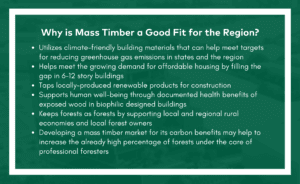Building Towards Climate Solutions with Mass Timber
21 July 2021What comes to mind when you think of wood buildings?
For many, thoughts might go to cozy cabins in the woods, homemade backyard sheds and treehouses, or even childhood Lincoln Logs. But for some experts in land management, climate science, permitting, economic development, and architecture, they think of something much bigger: mass timber.
Mass timber is a familiar yet cutting-edge building technology that can be used to construct a wide variety of climate-smart structures up to 18 stories. Offering significant climate benefits, the material represents a promising solution to cities and states facing increases in urban populations amidst ambitious decarbonization goals: building construction and materials produce about 11% of annual greenhouse gas emissions, and city populations are estimated to more than double by 2050.
Mass timber is a set of structural building materials that assembles smaller wood sections (often commodity lumber such as 2x4s and 2x6s) into large, multi-layered panels, beams, and columns used to build multi-story buildings for commercial, housing and institutional use. Animation courtesy of Generate.
Given these prospects, implementing climate-smart building solutions for growing urban populations is key to achieve both environmental and economic development goals. In addition, while emissions reductions are essential to meet climate targets, opportunities to leverage the carbon-storing capacity of natural systems are in high demand—and mass timber represents one such path forward.
Already widely used in Europe, Canada, Japan, Australia, and New Zealand, mass timber is growing in popularity in the U.S., with the number of mass timber buildings completed or in design having increased from approximately 30 in 2013 to over 1,000 in 2020. Despite growth at the national level, its utilization in the natural-resource rich and climate-proactive central New England and eastern New York region has been lower. With barriers like outdated building codes and debates over the role of forestry in climate mitigation, advancing this climate solution requires unifying diverse experts who often work in siloes. At the same time, Massachusetts’ Clean Energy and Climate Plan for 2030 requires land-based sequestration and storage that cannot be achieved through its land base alone—meaning regional cooperation is essential.
To facilitate this collaboration and advance mass timber’s use in this area, Meridian convened the Regional Dialogue on Incentivizing Mass Timber in Central New England and Eastern New York to Reduce Climate Change. Supported by ClimateWorks and Climate and Land Use Alliance out of their Natural Carbon Capture program, the Dialogue explored mass timber’s potential to meet critical housing and building needs, while also achieving climate goals. From September 2020 through June 2021, the Dialogue’s 35+ expert participants shared information, completed new analyses, and developed recommendations for state policymakers. The group issued these recommendations, as well as extensive background information on the material’s benefits, in their final report, Mass Timber: An Important Climate Solution and Economic Opportunity for Central New England & Eastern New York.
 The report represents a consensus of senior state government leaders alongside a diversity of stakeholders—from forest ecology and management, to wood building design and engineering, to economic development—across four states on a complex issue. From ensuring the development of a sustainable regional supply to promoting new educational opportunities on mass timber, the Dialogue’s membership will take these recommendations forward across the region to combat climate change, build affordable housing, and promote local and regional economic development.
The report represents a consensus of senior state government leaders alongside a diversity of stakeholders—from forest ecology and management, to wood building design and engineering, to economic development—across four states on a complex issue. From ensuring the development of a sustainable regional supply to promoting new educational opportunities on mass timber, the Dialogue’s membership will take these recommendations forward across the region to combat climate change, build affordable housing, and promote local and regional economic development.
We invite you to dive deeper into the report and learn more on the Mass Timber Regional Dialogue website. And while you’re at it—look out for mass timber buildings in your area. While not quite the same as your childhood Lincoln Logs, they still may cheer you up.
